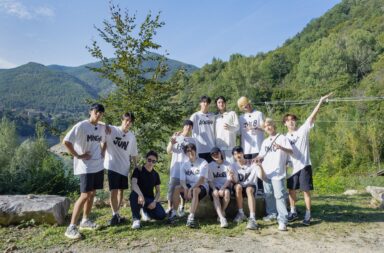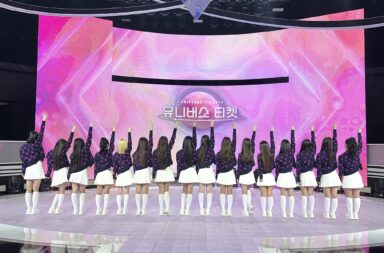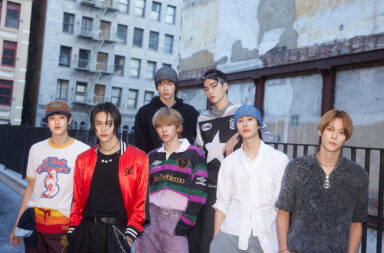
After a successful three-month run, April saw Mnet’s latest idol survival show, Boys Planet, finally debut their first Produce-style boy group since 2019’s ill-fated X1. Consisting of nine members, ZeroBaseOne (shortened to ZB1), have made history by being the broadcaster’s first group with more than three trainees from one company (Yuehua Entertainment), more than one Chinese member, and a non-Korean member as the centre.
Yuehua trainee and Fujian native Zhang Hao deftly navigated a minefield of pitfalls to rise through the ranks of the competition, winning favour with not just international voters, but also with notably sinophobic Korean audiences. The final saw him leap from an already unprecedented second place to first place, switching positions with the previously immovable favourite, Sung Hanbin. Meanwhile, fellow Yuehua Chinese trainee Ricky became the dark horse of Boys Planet, beating out several similarly rising contestants to slide into fourth place. Along with Korean-Canadian Seok Matthew, these three became the only trainees from the show’s G Group (“G” meaning “global”) to debut in the final lineup.
As with the show’s predecessor, 2021’s Girls Planet 999, Boys Planet differentiated itself from the otherwise identical Produce franchise by dividing trainees into factions based on nationality. However, while the former saw negligible domestic viewership, thanks to disillusionment with Mnet’s rigging shenanigans and a politically untimely focus on Chinese trainees, the show’s two-year break and new, non-specific “global” category allowed Boys Planet to whip up a fervour akin to the original Produce craze. This was helped by higher interest in boy groups, lifted restrictions on live audiences, and kinder editing which in general emphasised friendships and bromances over conflict (unlike Girls Planet 999).
Still, Boys Planet was by no means lacking in drama; plenty of trainees were cut down after unfavourable edits portrayed them as selfish, discriminatory, or lazy. The majority of these targeted Chinese trainees – Krystian Wang, Ma Jingxiang, and Zhang Shuaibo, along with Korean trainee Lee Daeul – all fell in the ranks following edits which (whether or not they accurately represented the truth) were clearly aired with their downfalls in mind. Coincidentally or otherwise, all had seen steady popularity up until that point.
For reasons like this, the willfully toxic, us-versus-them narrative remains the Planet franchise’s greatest flaw. From the get-go, Boys Planet constantly overemphasised differences between the two groups, pitting them against each other with their careers on the line, airing snide comments from contestants playing into their narrative, and designing antagonistic rules which gave K Group contestants a consistent advantage. For example, during a dance battle filler segment, K Group emerged triumphant when producers suggested that the last of three rounds overtun the whole game – after G Group had just won the first two.
Additionally, it was not until six weeks in that K Group and G Group trainees were allowed to intermingle, by which time half of the 98 contenders had been eliminated. Such a binary strategy is both unnecessary and hypocritical, not just because things like “evil” editing are plainly discriminatory, but because the only reason K-pop has seen the success it has is because global audiences have opened their minds to something that is foreign to them. Boys Planet‘s creators’ attitude is thus a slap in the face to anyone who has stood up for K-pop when the people around them ostracised it for being foreign and, to their minds, inferior.
In addition, there is increasing fluidity in the cultural backgrounds of contestants anyway, especially when it comes to how “Korean” someone is. Boys Planet featured plenty of non-Korean contestants, such as Haruto and Wumuti, who spoke Korean fluently and were well-versed in the culture, having spent much of their youth there. Conversely, ethnically Korean contestants who grew up elsewhere, like Seok Matthew, showed much less familiarity with the language and culture. Nevertheless, they were thrown into G Group, with the implication that they should be considered different from local contestants.
This kind of binary categorisation does not reflect reality enough to justify such differential treatment. Nowadays, culture is increasingly a spectrum, often reflecting upbringing and personal choices alongside or even sometimes over ethnicity and nationality. The increasing exchange between cultures globally, thanks to the fluid movement of people and improved access to the Internet, means that this spectrum will only get broader.
Simultaneously, when it comes to pop culture, we see more and more people converging towards a single, melting-pot culture native to the Internet, consisting of a basic level of English (among other languages, including Korean), a sense of humour, a set of values, and an understanding of modern struggles. A meme or challenge can now spread from any corner of the globe to the other, literally overnight. This convergence started long ago, but it’s only now that a worldwide generation of adults who grew up on the Internet – the biggest equaliser of culture and driver of globalisation ever to exist – are starting to demand art that represents them.
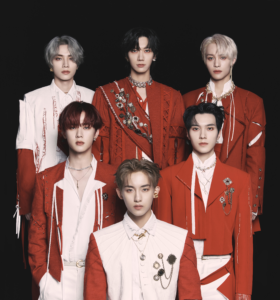
A look towards recent culturally innovative work reflects that convergence, and many of these artists eschew old-school, binary labels accordingly. Exo’s Lay and Got7’s Jackson bridge Chinese culture and Western hip hop using K-pop-influenced execution; RM assembled a diverse lineup of Western and Korean artists for his album; WayV produce multilingual K-pop-style music markedly different from C-pop; XG demonstrate mastery of Western and Korean trends in English-language, K-pop-packaged songs, despite being Japanese. Outside of K-pop, you can also find successful examples such as Khruangbin, a band who merge global influences old and new in tracks they call “Earth music”.
All of these artists are both difficult to categorise using traditional labels, such as “K-pop”, and have been richly rewarded for their efforts to innovate. They became successful by demonstrating mastery, dedication, and respect for their influencing genres, while also adding their own ideas and identity. For K-pop specifically, this means combining the best of K-pop’s strengths – self-discipline, teamwork, humility, creativity, multiple art forms, and attention to detail – with their own unique influences, such as English rap influences for XG, and Chinese melodic and lyrical influences for WayV.
Within Boys Planet, you can see this at work with contestants like Haruto, who is Japanese, attended international school, then moved to Korea to study after becoming interested in K-pop. His fluency in three languages, along with their respective pop cultures, helped him pull off lines like Sehun’s legendary “Shawty, I’ma party till the sun down” better than the original; mentor Lil Boi whistles and says he performs like a professional rapper. Meanwhile, Jay, an American contestant who is ethnically Filipino-Chinese-Irish-Hungarian, has a soulful, Western vocal style, but has been pursuing a idol career for several years. His style itself is not groundbreaking, but its placement in a mainstream boy group is; mentor OneStar is visibly impressed with his high note and exclaims that Jay sings it better than he could.
It’s not that they are necessarily better than their Korean counterparts – they simply have something to offer that is refreshingly different from what has come before. Now that this is being shared on mainstream platforms, it’s clear also that this is where the next generation of K-pop is headed.
Global cultural exchange is therefore sparking innovation, improvement, and excitement right here and right now. Young talents (not just idols, but all kinds of creatives) from all over the world are flocking to K-pop to learn and create, and as a result, it is becoming one of the most vibrant, fertile grounds globally for producing excellent art. As long as it remains open to these people, K-pop will continue to birth legend after legend, following in the steps of BTS and Black Pink.
Zhang Hao, the winner of Boys Planet, may well become the next in that list. His story and trajectory overturned years, if not decades, of the overwhelming narrative within K-pop that in order to be successful, no more than a small number of foreigners can be accepted into a group, and they are often token characters at best. This was the mindset pervading the first half of Boys Planet, but Zhang Hao’s all-rounder skillset, social intelligence, and sharp intuition helped him seize power over his story in a master game of PR chess.
As the G Group centre for theme song, “Here I Am”, he was initially positioned as the inferior rival to K Group’s centre, Sung Hanbin – when Hanbin won the “final” centre position, he was literally elevated above Zhang Hao on an even higher platform. After discovering how much they had in common, however, the two became best friends, and their closeness and skilful image management meant that Mnet had little choice but to give them and their ballooning fanbase what they wanted – collaborative performances, behind-the-scenes content, and screen time for their wholesome chemistry. Their bond eventually meant that to support one was to support the other, and as this storyline blossomed, Zhang Hao went from simply being the best G Group performer to being a prime debut candidate joined at the hip with the domestic favourite.
On top of this, Zhang Hao managed to do exactly the right thing at every critical juncture. Demonstrating strength and kindness as a leader, he led his majority-foreigner team to an unprecedented victory in the original song battle. Demonstrating humility and grace in a smaller role, he became the standout performer anyway and won the majority-Korean audience vote. Finally, demonstrating diligence and a sense of responsibility to viewers, he made sure to speak Korean 99% of the time, perfect his pronunciation of Korean lyrics, and opine clearly that K-pop idols should be able to speak and sing in the language fluently. It was this hand of cards, masterfully played over the course of twelve episodes, that propelled Zhang Hao to a shocking, but incredibly well-deserved number one position in the final.
However, while this has seen Zhang Hao rightfully become the stuff of legend, it should not have been necessary for him to tread so carefully in the first place – to epitomise the perfect human at all times, because he could not afford to make the slightest mistake. Increased diversity of every kind in K-pop should be celebrated, not hidden; for example, contestants like Cha Woongi and Seo Won were allowed to show greater freedom of gender expression on Boys Planet than any previous Produce cohort, and they were some of the most refreshing characters as a result.
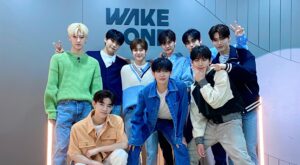
Mnet blithely claimed that ZeroBaseOne are the first fifth-generation boy group, but what will truly make them and any rivals pioneers is a mindset embracing all forms of diversity. A mainstream group that reflects global diversity in 2023 (whether in culture, ethnicity, language, gender expression, vocal style, musical influences, visual features, etc.), while still offering the best aspects of traditional K-pop would be extremely refreshing, and from a business perspective, more marketable than ever. In this case, ZeroBaseOne missed out on talents like Haruto and Jay, but more than made up for it with the inclusion and rankings of Zhang Hao, Ricky, and to a lesser extent, Seok Matthew.
Mnet should remember that, by virtue of trying to export Korean culture to other countries, the hallyu (Korean wave) initiative itself advocates globalisation, and for years it struggled against the kinds of binary categorizations Mnet is now choosing to employ. For example, distinct genres such as Korean indie, R&B, and hip hop have often been lumped together with K-pop simply for being Korean-produced, while K-pop itself has always been viewed as separate to Western pop, even though often it pulls from the same pool of Western songwriters and influences.
As the latest iteration of hallyu coincides with the coming of age of a new, global generation, its audience has finally reached the critical mass needed to challenge those narratives. Now, the tables have turned, and Western industries are starting to take influence from hallyu instead. It has therefore become a powerful player, and so needs to both remember its roots and step up to the responsibility it holds towards its newfound audience.
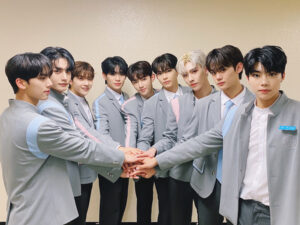
As K-pop’s previously disparate markets merge into one, that means meeting the demand for increasingly diverse art to match this increasingly diverse market. We should therefore stop scoring lines where borders used to exist, as Mnet tried to do with Boys Planet, because sooner or later, these borders will be gone entirely. Boys Planet is a microcosm of globalisation at large, and we the mutating global audience respond to its global contestants, along with culturally ambiguous artists like XG and WayV, precisely because they increasingly speak to and represent us. That’s only going to become more common, and not only is it okay, it’s good for everyone, everywhere – including the “K-pop” industry.
(Billboard[1][2], Guardian, Korea Times, Nielsen Korea via Soompi, Rolling Stone India, Teen Vogue, YouTube. Images via Mnet, SM Entertainment, and WakeOne Entertainment.)
